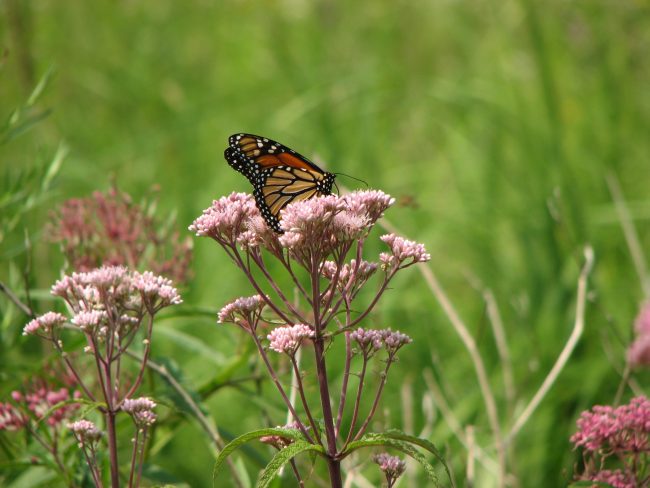By Vijai Pandian
Why are Pollinators important?
Pollinating insects such as bees, flies, butterflies, moths, wasps, and beetles play a key role in seed production for many flowering plants in the world. Nearly $15 billion worth of food crops in U.S. is dependent on the pollinating insects and others. Almonds, apples, oranges, cherries, blueberries, pumpkins, gourds, zucchini, cantaloupe, macadamia, cashews, strawberries and cocoa are common fruits and vegetable crops that benefit from pollinating insects. Unfortunately, the populations of many pollinating insects have sharply declined in the last few decades and recent studies have documented four bumble bee species that are close to extinction. Habitat loss, fragmentation of existing nesting and foraging grounds, diseases, parasites, agricultural practices, pesticides and abnormal weather conditions are some leading factors in the decline of pollinating insect populations.
Ways to encourage pollinators in your garden:

- Plant diverse native plant species that bloom in different seasons to attract pollinators. Use a wide variety of floral colors and plant them in groups of single colors to capture pollinator attention. For instance, bees are attracted to white, blue, yellow, and purple flowers; butterflies like orange, red, yellow, and purple flower colors. Select simple and pollen rich flower cultivars rather than hybridized flowers that have double flower petals and lack in pollen. For pollinator plant selection visit the Pollinator Partnership website to see an ecological guide.
- Solitary bees build their nests in an open sandy area (preferably a dry site). Leaving a few patches of bare ground in an isolated part of the landscape can provide nesting habitat, and Minimizing tilling and foot traffic in those isolated areas will protect ground dwelling bees.
- Rock walls, wooden stumps, and leaf debris also attract native bees for habitat. You can construct or purchase artificial bee nesting structures, but make sure to replace or disinfect those artificial structures every 2 years to prevent disease occurrence.
- In your vegetable garden, seed a few patches with buckwheat or clover to attract bees.
- Bees are highly sensitive to any contact pesticides and their residues. Never spray insecticides during the blooming period. Gardeners are highly encouraged to integrate a wide range of cultural and mechanical practices to control garden pests. Use appropriate pesticides as a last resort and apply in accordance to label directions.
- When using insecticides in the lawn, mow off any blooming weeds before or after the treatment. Give preference to granular formulated insecticides and water the lawn immediately after application.
- Spread the word about pollinators and get involved in citizen science projects like Bumble Bee Watch, the Great Sunflower Project and Monarch Watch.

